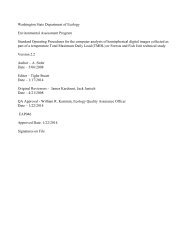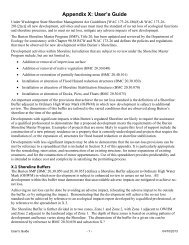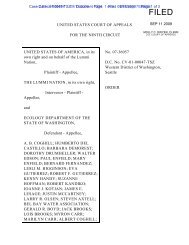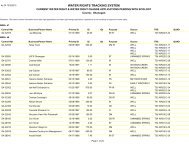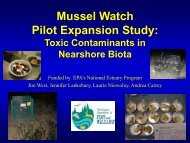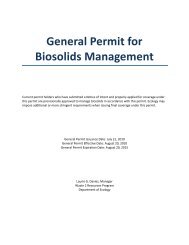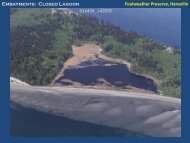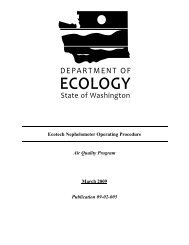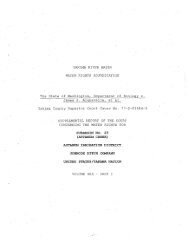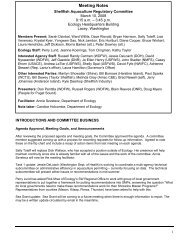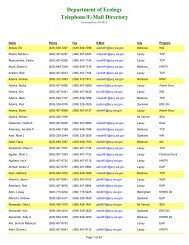WRIA 62 WMP 032305 - Washington State Department of Ecology
WRIA 62 WMP 032305 - Washington State Department of Ecology
WRIA 62 WMP 032305 - Washington State Department of Ecology
Create successful ePaper yourself
Turn your PDF publications into a flip-book with our unique Google optimized e-Paper software.
March, 2005 -58- 023-1289-003.3040<br />
4.2 Background and Rationale for Water Quality Issues<br />
The following sections provide background information for each <strong>of</strong> the water quality issues.<br />
4.2.1 WQUAL-1 Background and Rationale<br />
Problem <strong>State</strong>ment: There is a need to develop a protocol to coordinate and ensure that <strong>WRIA</strong><br />
<strong>62</strong> water quality data is provided for input into the Joint Stock Assessment Program (JSAP)<br />
database.<br />
During the early stages <strong>of</strong> Phase III Planning, the lack <strong>of</strong> coordination between the entities collecting<br />
water quality data was identified as a concern. The Watershed Planning Unit considered applying for<br />
supplemental funding to develop a web-enabled water quality database and protocols for entities<br />
collecting data within the watershed to submit information for inclusion within the database. The<br />
intent <strong>of</strong> the project was to have up-to-date water quality data for <strong>WRIA</strong> <strong>62</strong> easily accessible from a<br />
single location. Discussion <strong>of</strong> the project raised concerns that a number <strong>of</strong> water quality databases<br />
already exist, such as the U.S. Environmental Protection Agency (EPA) Legacy Data Center and<br />
STORET and <strong>Ecology</strong>’s Environmental Information Management System (EIM), and that creation <strong>of</strong><br />
a <strong>WRIA</strong> <strong>62</strong> database would be a duplication <strong>of</strong> effort. However, concerns were raised that the<br />
existing databases do not include all water quality data for <strong>WRIA</strong> <strong>62</strong>. In addition concerns were<br />
raised that an active steward would be required to manage a <strong>WRIA</strong> <strong>62</strong> database into the future.<br />
The Kalispel Tribe informed the Watershed Planning Unit that the Joint Stock Assessment Program<br />
(JSAP) database was in the process <strong>of</strong> being developed and populated and it is the intent <strong>of</strong> the JSAP<br />
to make this data accessible via the internet. The Joint Stock Assessment Project (JSAP) specifically<br />
addresses NPCC Council measure 10.8B.26 <strong>of</strong> the 1994 program. The JSAP is a management tool<br />
using ecosystem principles to manage artificial fish assemblages and native fish in altered<br />
environments existing in the Columbia River System above Chief Joseph and Grand Coulee Dams.<br />
Following discussions with representatives <strong>of</strong> the Kalispel Tribe, the Watershed Planning Unit agreed<br />
that the most effective use <strong>of</strong> resources would be for the <strong>WRIA</strong> <strong>62</strong> water quality data collectors to<br />
submit groundwater and surface water quality information to the Kalispel Tribe in the required format<br />
for inclusion within the JSAP database. Since the JSAP is a long term project, funded by the<br />
Bonneville Power Administration, the Watershed Planning Unit felt the system would be maintained<br />
into the future and that collaboration with the Kalispel Tribe to incorporate water quality data for<br />
<strong>WRIA</strong> <strong>62</strong> would be the most efficient use <strong>of</strong> resources.<br />
Coordination <strong>of</strong> the collection and reporting <strong>of</strong> <strong>WRIA</strong> <strong>62</strong> water quality data for submission to the<br />
JSAP database is expected to be accomplished by the Watershed Planning Implementing Body and<br />
the Kalispel Tribe. The Watershed Planning Implementing Body is expected to coordinate data<br />
collection and submission <strong>of</strong> the data to the Kalispel Tribe. This will involve identification,<br />
collection and quality assurance <strong>of</strong> data not currently in the JSAP database and submission <strong>of</strong> these<br />
data to JSAP managers. The Kalispel Tribe is expected to enter the data into the database and ensure<br />
that the data are available via the internet.<br />
4.2.2 WQUAL-2 Background and Rationale<br />
Problem <strong>State</strong>ment: Eurasian watermilfoil and other aquatic nuisance weeds pose a threat to<br />
native habitat and public safety in the Pend Oreille watershed.<br />
The growth, and in some locations proliferation, <strong>of</strong> Eurasian watermilfoil and other aquatic nuisance<br />
weeds such as curlyleaf pondweed in <strong>WRIA</strong> <strong>62</strong> impairs recreational activities (e.g., boating, fishing<br />
<strong>WRIA</strong> <strong>62</strong> <strong>WMP</strong> <strong>032305</strong>



